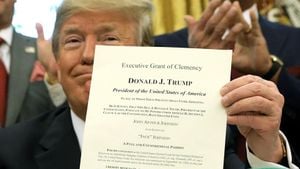President Donald Trump has taken aim at the Federal Emergency Management Agency (FEMA), expressing dissatisfaction with the agency's disaster response capabilities during his first interview since returning to the White House. Speaking to Fox News host Sean Hannity, Trump criticized FEMA for its handling of recent disasters and suggested the agency complicates recovery efforts rather than helping them.
"FEMA is gonna be a whole big discussion very shortly," Trump stated, adding, "I’d rather see the states take care of their own problems." This comment reflects Trump's long-standing belief in reducing federal involvement during disasters, advocating instead for states to execute their recovery plans with federal financial support as needed.
The backdrop for Trump's remarks includes significant wildfire damage currently affecting California and the aftermath of hurricanes battering the southeastern states, particularly North Carolina. "FEMA has not done their job for the last four years," he lamented, targeting the agency's performance and hinting at potential reforms.
Trump's critiques have gained traction among some Republicans, who have voiced concerns over what they perceive as bias within FEMA’s disaster response. Their complaints were particularly vocal following Hurricane Helene's impact on Republican-leaning North Carolina, where claims arose alleging diversion of federal aid to illegal immigrants. These sentiments have fueled Trump's assertion, claiming, "The Democrats don’t care about North Carolina. What they’ve done with FEMA is so bad." To bolster his argument, he pointed out instances where he believes FEMA failed to adequately respond to hurricanes and other disasters.
He urged for significant discussions around FEMA, indicating he may seek to downscale its federal oversight. Trump's argument rests on the assumption of state capability to manage disasters independently, mentioning, "If they get hit with a tornado or something, let Oklahoma fix it ... and then the federal government can help them out with the money." This perspective fundamentally challenges the expanded role Congress has assigned FEMA since its establishment and its integration within the Department of Homeland Security following Hurricane Katrina.
While discussing the recent wildfires devastating California, Trump did not shy away from placing blame on state leadership. He singled out Governor Gavin Newsom, stating, "I don't think we should give California anything until they let water flow down." This comment came as the state continues to combat severe droughts and fire conditions exacerbated by climate changes—factors which many experts argue contribute heavily to the recent disasters.
The tension between state and federal response methodologies could lead to considerable shifts if Trump's suggestions are enacted. Under his administration, there might be attempts to reform emergency management, shifting more responsibility to states and localities, allowing them to determine their disaster responses before federal assistance kicks in.
Trump's proposed changes come at a time when state and local governments are increasingly expected to handle their emergency preparedness, especially under the growing threats of climate change. Such structural revisions could spark considerable debate on the federal government’s role during national crises, with emergency response at the center of contention.
Despite Trump’s controversies, he appears poised for potential support among those who favor reduced federal intervention, arguing states should manage their disaster responses more nuggetedly. It remains to be seen how Congress would react if Trump moves forward with plans to modify FEMA’s foundational roles.
Following his remarks about FEMA, Trump is set to visit North Carolina on Friday to assess the damage and response from Hurricane Helene, before heading to California to evaluate the wildfires. This move not only signifies his commitment to witness federal assistance needs firsthand but also to involve himself directly with the state governments affected.
Trump's comments resonate with his earlier presidency, which had similarly stirred conversations around federal funding for states based on adherence to federal policy preferences. His administration previously proposed attaching conditions to federal aid, particularly targeting states with sanctuary policies related to immigration enforcement.
The notion of evaluating emergency responses through the lens of political affiliation presents new challenges for federal aid, especially when contrasted with historical precedents where aid was more uniformly distributed. Trump's latest position on FEMA and disaster management is likely to influence policy discussions within Congress moving forward.
His remarks encapsulate the broader ideological battle over governance and disaster response, particularly on the effectiveness and impartiality of federal agencies serving the public goodwill. The ultimate fate of FEMA's future and Trump's proposed reforms will hinge heavily on the outcome of political negotiations and the upcoming electoral climate.



